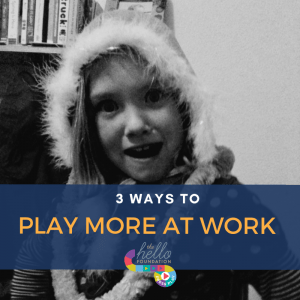We often hear that play is important for developing healthy and happy brains. As a school-based SLP, I am in a unique position to incorporate play into the days of my students and co-workers — and into my own! Dr. Stuart Brown, play researcher and TED talk presenter, recommends incorporating more “joyful, non-repetitive activities” into our lives!
3 Ways To Play More At Work
Here are 3 ways I’ve identified to bring play back into my work day (while still getting my work done!):
1. Schedule a PLAYdate
Use your love of social to your advantage by working collaboratively. Reach out to your OT and PT to see if there are any scenarios that might work for co-treatment. That really challenging student? See if you can snag 15 minutes with 2 other adults who work with him (teachers? aides? specialists?). Chances are you’re all seeing some of the same behaviors. Generating some ideas together is easier than thinking on your own and will probably lead to more consistency across their day. You can up the PLAY-factor by putting some chocolate out on the table or brewing a pot of tea!
2. Change the disPLAY
A little change of scenery can go a long way! Do you need a new background color for your bulletin board? This list of winter crafts really gave me many options. I often forget how much I love winter for vocabulary and S-blend practice.
3. Get out on the PLAYground
Yes, it’s dark. Yes, it’s rainy and snowy and slippery! But the playground is a great place to play, and being outside is good for you and good for the kids! Dress for the weather and enjoy benefits ranging from a strengthened immune system to increased alertness and a fun and novel approach to speech and language goals.
As part of our focus on Play at Care Options for Kids, formerly The Hello Foundation this year, I read this article from the American Psychological Association on the link between laughing and learning. It’s easy to see this link in the kids we work with. Laughter helps us let our guard down, open up, and become slightly more vulnerable. And from there we can learn to take on something new. What do you do to increase laughter, learning, and play in your therapy sessions?






